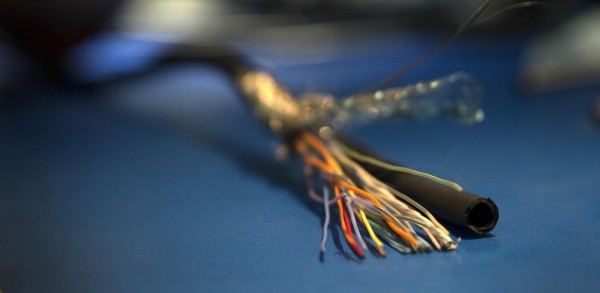

Four hundred-dollar hammer, eat your heart out. There’s a new bizarre boondoggle in the Pentagon.
Military budgets always come in for scrutiny, and the scrappy Marine Corps knows that better than other services. But it took an E-4 to figure out that the Corps was getting jammed up on a pricey electronic cable — a cable worth $4,000 that, for some reason, would have cost the Marines almost $64,000 to buy from a contractor.
And it all started because he needed to fix a radio.
Last October, Cpl. Riki Clement — then a lance corporal — with Okinawa’s 3d Maintenance Battalion, Combat Logistics Regiment 35, was tasked with getting the equipment to work. That meant he needed a specialized, out-of-date connecting cord — which would have taken months, and a huge chunk of change, to purchase.
Related: Bandsman Tricks Marines At Barracks Into Standing At Attention »
“At first, the maintenance repair shop could only wait for supply to replace the cord, which would take six to eight months,” Clement explained in a DOD press release. “It’s just a whole bunch of wires soldered into pins which makes it virtually invulnerable to Marines, which is the important standard we are holding ourselves to.”
So Clement did what Marines do — call it comshaw, ratfucking, midnight entrepreneurship, or whatever: He scrounged components from other kits around his shop to reverse-engineer a replacement for the cable, according to Stars and Stripes.
Once he had all the pieces laid out, Clement — who earns base pay of at most $24,000 a year — realized that the cable, listed for sale at two and a half times his salary, was really worth just a fraction of that.

An error in the Marine Corps supply system caused this cable to be incorrectly priced at $64,000, when in reality it’s valued at $4,000.U.S. Marine Corps photo
“There may be a good reason for the price, but based on us taking apart the cable and researching the individual parts, we’ve found no reason for this part to cost as much as it does,” Clement told Stripes, which broke the story in December.
Not only was Clement right, he’d saved the military at least seven figures once higher-ups caught wind of his work. He produced a presentation “made up of color-coded pictures and drawings, which make it easier for other Marines in his field to follow,” according to the release.
“A week later I was told that Quantico had got a hold of my Powerpoint and they liked what I had done,” Clement said.
Clement’s reproducible cord-rigging saved the government $15 million a year — the Corps hadn’t purchased any replacement cables at the retail price, but now they had an in-house solution.
Following the Stars and Stripes coverage, the Corps conducted an investigation and identified five other price errors in the catalogue.
“The catalogued mistakes were made nearly seven years ago,” Tony Reinhart, the command’s team lead for automatic test systems told Stripes. The radio cords are still expensive to produce, due in large part to their quality and materials, but Clement-engineered replacements cost 1/16th of the $64,000 retail price.
There’s no word on whether any of the cash Clement saved will find its way into a signing bonus — he’s pretty much earned his own salary hundreds of times over by saving the Corps millions, after all. Maybe he’ll just have to settle for his Navy and Marine Corps Achievement Medal.